Small Ripples Make Big Waves
Small things you can do in your daily life to help the environment- and maybe even your wallet
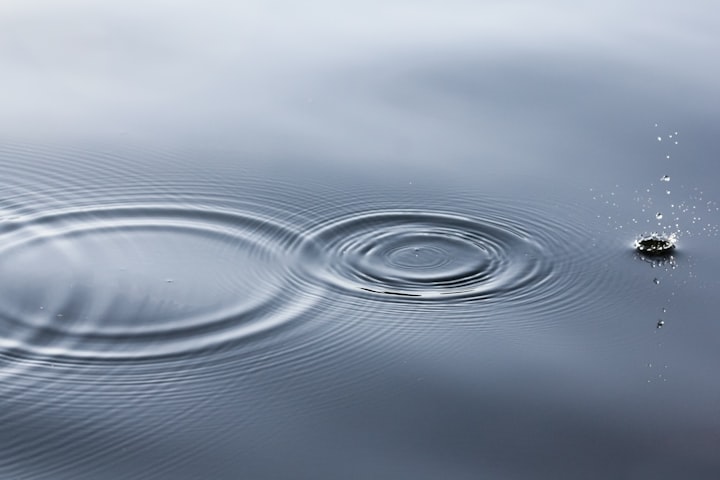
In our current climate- social, political, and yes, environmental- going more eco-friendly is a big talk of the town. A lot of pressure is put on daily life, rather than the large companies that are truly responsible for the state of our world. This focus needs to change in order to truly protect our planet, however, it doesn't hurt to implement some of these changes in the small scale too. This can also assist, and put pressure on these big companies, as we stop giving them our money.
When most people think of going a bit greener, there's often the misconception that it has to be a huge lifestyle change. The things they have to do now is suddenly going to eat up all of their time, money, and other various resources. This is so far from the truth that you'd have to search the vast, ever growing infinities of space to try and find it. In fact, there's a lot of small changes that you can make that hardly impact daily life at all, and could even save you money in the longer term.
So, what are these changes?
Substitute single use plastics
There are a multitude of ways in which this can be done, because there are countless things that we use single-use plastic for. Think about it- what do you do in a day that utilizes this seemingly endless resource? Is it your morning drink from a coffee shop? A plastic bag from the grocery store (more prevalent in the US rather than Europe)? The bottle that your pop or water comes in? What about that microwave dinner tray? If you're someone who menstruates, what about your hygiene products? Your medications? Cleaning product bottles?
The list goes on for miles.
Okay, well, what can we do about that? Again, these are more big industries that make these products, that we kind of have to use, right? Well, yes and no. Yes, this is industries exploiting daily things in life, but there are alternatives. Almost as many alternatives as there are things we use!
Covid aside, there are a lot of coffee shops that allow you to use your own reusable cup for coffee. This method is variable depending on your choice of venue, but I know before the pandemic Starbucks was really starting to go into it. I'm not a big fan of their drinks, or prices, but I've been told using your own cup allows for a discount. It's not an overly substantial one, but when a drink can easily cost you 8$ and counting, any little bit helps your crying wallet. Not only that, but it's less plastic being consumed, and less garbage that ends up in our streets, landfills, water systems, and more.

Another alternative to that would be to make your own coffee. This would be even cheaper for your budget, as well as cuts out the fuel emissions you would have used to get there and the wait in the seemingly endless drive through line. It could also save you time in the morning, as you don't have to anticipate an extra 5, 10, or even 25 minute coffee run that it could turn out to be. However, if you do decide to make your own coffee, I would recommend not using the ones that use single use plastic cups. There are plenty of machines that don't use them, even individual-cup makers! If that's more your speed and you didn't know products like that existed, here are a few options.
When you go to the grocery store, you obviously have to leave with bags, right? I mean, you can't just carry your purchases all in hand! And those paper bags aren't very sturdy. At least, the handles aren't, anyway. They always break through! You have to use the plastic bags in order to get everything home safely.
Except, you don't. Have you ever seen people bring in their own reusable bags? Maybe you've even seen them near the checkout counters, and thought about getting them yourself. DO IT. If you're new to the idea, it may take a few trips to remember bringing them in the store before checking out, but it's absolutely worth it.
Nowadays, some stores are even charging you to use the single use plastic bags instead of having your own. This isn't the case in most places near me in the States, but something even more restrictive is in place in many European countries.
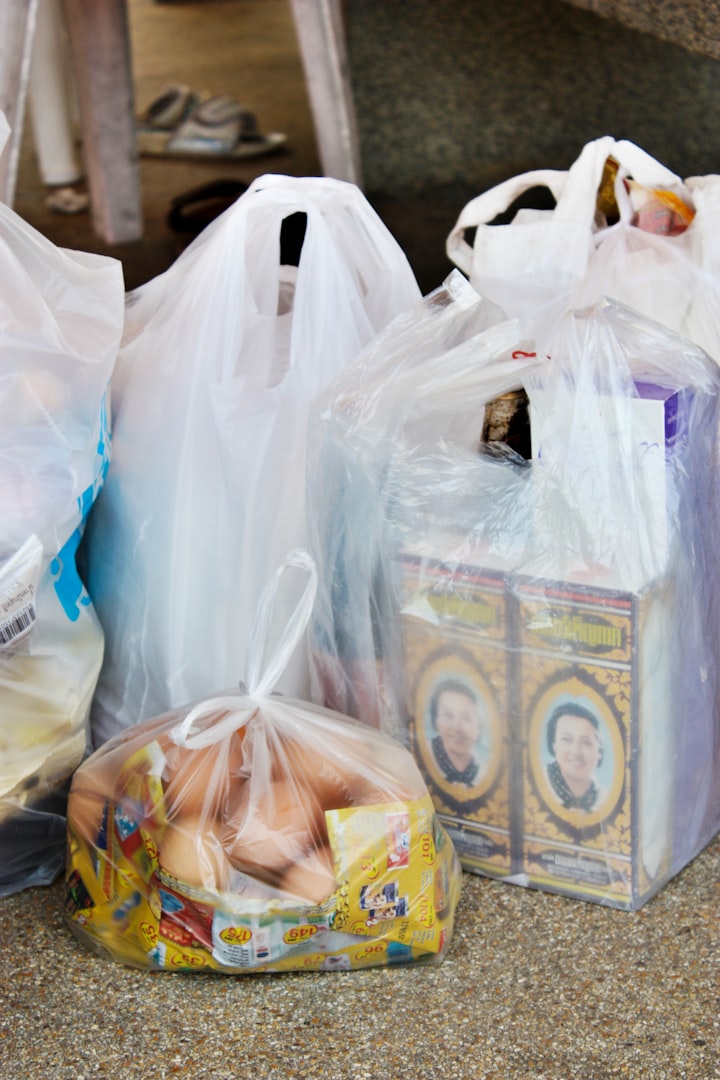
Where I'm at in the EU, they don't even have the plastic bags. It's not an option. You either bring in your own bags, or you purchase one (or several) at checkout. They don't cost much- just over a dollar or so for the fancier ones (at the moment, 1 euro= ~1.19 dollars)- so it's not going to break your budget to do so. But, when I first got here and went food shopping, I had no idea. It hadn't even crossed my mind that plastic bags might be banned! Now, I use my reusable bag every time I shop, and I plan to continue that when I get back to the States.
Not only do these bags cut out single-use plastic that ends up in parking lots, flying along the freeways, in our forests, and in the oceans, but it's also a lot sturdier. You don't have to double bag your canned goods or heavier bags. The handles aren't prone to breaking, and your boxes won't rip through the sides. They're made to handle these things; They're made to last. I'll gladly pay a couple dollars for reusable bags that I can use over and over again for years, cutting out hundreds of single use plastic bags that I would have otherwise used and thrown away in that time.
Likewise, you can also cut plastic waste by getting rid of plastic sandwich bags and plastic wrap. Trade those in for reusable bags, or beeswax sheets. These can be used for sandwiches, snacks, partially cut produce (like an onion, or avocado), etc. They're easy to wash; just rinse with cold water and a little soap, and you're good to go! They won't last forever, especially the beeswax sheets (they are prone to melting, so when I say cold water, I mean it), but they definitely last longer than single use plastic bags and plastic wrap. Because you can use them for longer, they're not only a better product for the environment, but also easier on your wallet. The beeswax wraps are also compostable, as they are made of all natural product. It's a win-win!
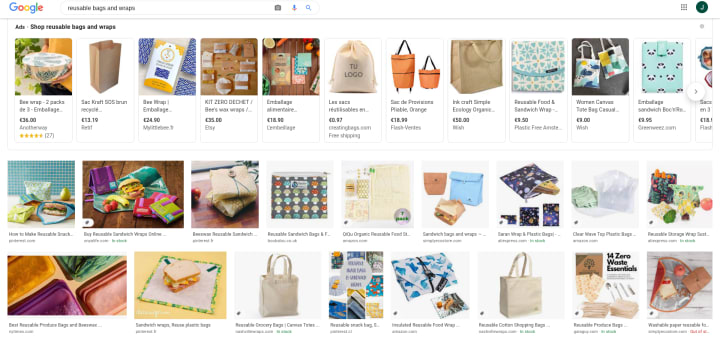
As for single use bottles, there are a few things you can do to cut down the impact as well. Some of them have to be recycled in different ways, though.
For instance, in the US, pop bottles can be recycled with a potential for cash return. The amount changes per state, but Michigan has one of the highest rates at 10 cents per eligible canister (each object will show if it's included in this list, with the state's initial and amount due. Ex: MI 10¢.) It's actually proven that the higher the return rate, the more people tend to recycle these objects. When you're paying extra at purchase for the bottles, you have more incentive to return the plastic, right? Absolutely. Here is a PDF showing this correlation, put together by bottlebill.org.
Now, in these states at least, you don't even have to go anywhere special to return the bottles. There's a lot of machines in grocery stores that will count and sort the product, and then give you a receipt that you can use at checkout to go towards payment (like a coupon), or you take to the service desk for cash. However, some places will limit the amount you can get back at a time, so check the location before turning in 50$ worth of bottles and expect cold hard cash. But another cool thing is that you can do this on your own schedule. You want to turn in bottles as you use them? You can do that. Want to turn them in for every grocery trip you make? Absolutely, you're more than able. Want to wait until you have a whole bunch, so when you really need the money for food you have it? The option is yours, friend. Do what work for you- as long as you're recycling. *Note, these machines also accept glass and metal! They are all for drinking materials, such as pop (or soda... or, whatever anyone outside the Midwest calls it), alcohol, or some juices. Most water bottles and juices aren't accepted, however. Again, look at the canister and it will show if it's included in these state's bottle bills, or if its just recyclable!*
The downside of this, is that it is so variable by state regulation. In states that don't have these bottle bills, they may not have these machines, either. Some do, but that varies as well. Also, if you're not being charged for the bottle at purchase, and don't have an incentive to return them after use, a lot of people just... don't care. It also plays a factor if they have to actually drive the recyclable material to a recycling plant, or even pay to do so. This impacts overall recycling, including single use bottles that can't be turned in for a monetary return: such as water, soap bottles, and any other recyclable material. This isn't the case where I'm from (thankfully), but I've heard enough stories to know that this isn't as feasible for everyone. Which... is really unfortunate and definitely plays a rather large role in the amount of this ending up in the trash rather than a recycling bin. But, if you can do so, please do! And, in either case, contact your local and state representatives. If enough pressure is put on them, and they realize this is something people want, they'll be more inclined to pass a similar bill and get these outlets for you. If they don't see the lack of these regulations as a problem, they're not going to fix them.
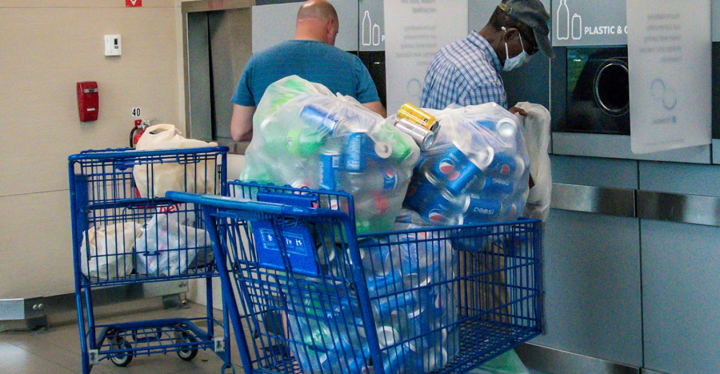
As for microwave dinners and other easy-to-make foods, there's only so much you can do when eating them. If that's how they come, and that's what you're buying, that's what you get. Even if the tray is paper with a coating on it, but then has a plastic wrapper, then you're still getting that dose of single-use plastic. If possible, I would say try and go for brands or products that use as little of these plastic options as possible. This can be hard to tell sometimes, especially if the product is also contained in a box. But, if you know which ones are plastic heavy, try and keep your distance.
Also, these plastics are used all the time in fresh grocery product. Have you ever seen a pack of meat? More often than not, they're in plastic containers, or a Styrofoam one with plastic holding it all together. Sometimes, if you get the product from a butcher or meat counter itself, rather than the shelf of a major grocery chain, they'll come wrapped in paper instead. If this is an option, go for it! Not only will it cut back on the single use plastic, but, if it's a butcher or other smaller business with a meat counter, it helps your local businesses. Many smaller butchers and smaller farmer's markets are often overlooked- but they also tend to use the least amounts of plastic, artificial fillers, and preservatives. This also means that the product your buying will be fresher, as well as healthier for you to consume. All while cutting down on your environmental footprint!
Now, if you do get these products with the single use plastic, it's not the end of the world. You can still recycle that material- just make sure you wash it. It's something that should be done with anything you go to recycle, but it's especially important for anything that has contained food, particularly meats. Rinse it out with warm, soapy water, and you're good to toss it in that recycling bin! This will clean the product itself, putting an end to the growth and spread of potentially dangerous bacteria, but will also cut out and stop the increase in smell- particularly noticeable with chicken and especially fish. There are some things that won't be able to go in that bin, like paper trays coated in wax or plastic, but going for options that don't use these products or just the ones that you know can be recycled are a great start. Opt for those.
What about personal hygiene products? Those don't really contribute much, do they?
Yes, they do. More than you'd think. When looking at menstruation alone, over the course of your lifetime, you're looking at upwards of around 11,000 disposable products. Reports and articles, such as the one here, have shown that as much as 90% of your average pad is made of plastic, while, excluding the applicator, tampons use around 6%. Where is that plastic though? Think about it. What is the product wrapped in? A plastic film. What is attached to the sticky adhesive that connects the pad/liners to your underwear? Plastic. What's INSIDE the pad to hold the blood and prevent leakage? You guessed it: plastic.
Now, using one here and there isn't going to play a huge role in the environment, but when billions of menstruating people use tens of thousands of these products in their lives, it adds up quick. It also financially adds up quick- particularly for those who have heavier and longer flow periods.
As a menstruating human who experiences severe dysphoria during this time, I wish I could say there were an easy way to just forgo this process and products altogether. Unfortunately, this is not the case. However, there are other products that are more eco-friendly, and pocket friendly too.
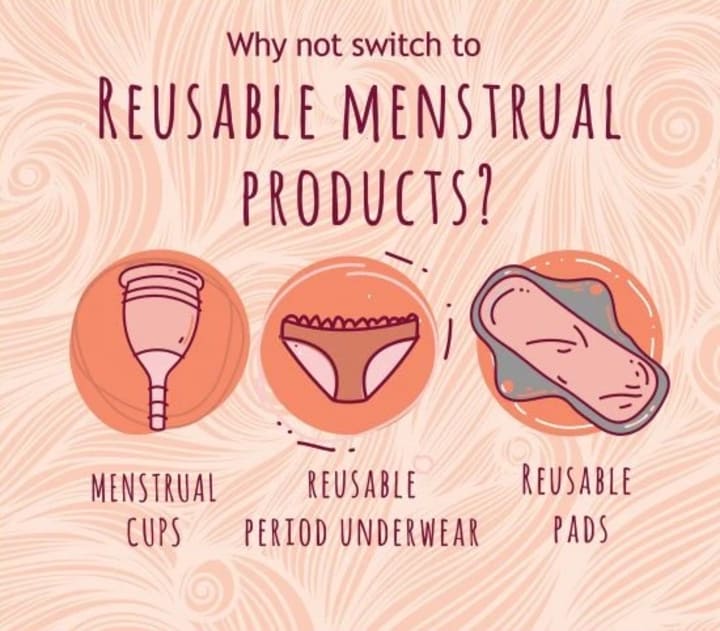
First, we have the menstrual cup. It can go by a few different names, but they're all the same product. It's a reusable cup that sits inside, and holds the stuff that's escaping your body during this time. Depending on which one you buy, you can spend an average of 10-50$ for just one. This may be a bit more expensive short term, as compared to a 5$ pack of pads for a cycle, but just extend that timeline. The cup, depending on which one and the usage, can last anywhere from 1-10 years. With the 5$ pack of pads for one cycle, by your third cycle, you already have a potential of saving money. By the end of the year, if you're someone with a regular period, you've already saved quite a bit, let alone in 3, 5, 10 years time.
The same thing can be said for period-made underwear and pants. Or, reusable pads, that often snap around the inner section of your undies. The upside here is that it doesn't have to go into your, yknow, but there are some downsides, too. The most obvious one is that you'll have to have more than one to last you a cycle. If you don't want to do laundry every day, you'll probably want at least 4, if not more. These can also be a little pricier than a menstrual cup, averaging around 15-40$. Depending on who you're buying from, this could be a whole bundle, such as a 3, 5, or 7 pack, but sometimes this could just be the cost of one. Just like with the cups, this price, and the quality/duration of reusable ability, depends on the manufacturer and product itself.
There's also taking into consideration the cleaning of these products. Now, you may not have to do a full load of laundry every day in order to clean them, but it's probably best not to let them just sit for days without even a rinse. After changing into some fresh ones, all you really need to do at the time is rinse them out, maybe even with a dollop of soap. If you fancy to, you could even let them soak in the soap and water, and do a full hand clean a smidge later. Or, if you already needed to do laundry, just toss it in the washer with the rest of your clothes. I personally would still do a rinse out with cold water first, but that's a personal preference. It's not a requirement, and can go in with your other clothes just fine.
Now, period products aren't the only hygiene products out there- nor are hygiene products limited to menstruating humans. There's also deodorant, shaving razors, toothbrushes... all of which use plastic and end up in the trash not long after use. Granted, most of these can, and are, used more than once, but still pile up pretty quickly.

Let's look at a pack of disposable razors. Some come in packs of 3-5, others upwards of 20. Why? Because these ones don't last long before the blade gets too clogged, too dull, and needs to be swapped out for a fresher one. Even if you get one where just the part holding the blades is replaced, but the handle is not, that's still a lot of plastic that is briefly used and tossed to the wayside. Yeah, these are cheap options, but when you have to buy several of these a year, even that price adds up, alongside the plastic.
Try switching to an electric or battery powered razor, or go for a waxing route. Electric/battery powered razors do cost a bit more, but in the long run, it'll pay off. Especially if you opt for one that doesn't need new batteries, but has a way to recharge the ones it has. Then, you don't have to keep buying batteries- which are often more expensive than disposable razors as well- but you also aren't contributing to the excess of terrible waste from batteries that aren't properly disposed of. Have you ever had a battery that corroded, or leaked battery acid? Yeah, the dead batteries you throw away can still do that, too, and get into the environment it finds itself rotting in. Please properly dispose of all your battery (and electronic) products.
As for deodorant, there are now companies that sell refills of the stick, that you place into a reusable holder. A lot of these companies are still small scale and independent, but that also means that your money goes to a real person rather than a big name company that doesn't properly pay their workers, as well as helping reduce your overall waste. Rebel from the big names and help yourself and others with refillable deodorants!
I'm also not saying not to brush your teeth. Please, please brush your teeth. I don't think anyone wants to smell your breath if you don't- especially if you ate a particularly rancid-scented meal the night before. Not to mention all the dental and health complications that can come with poor mouth hygiene. Brush your teeth, just don't use plastic toothbrushes.
Instead, opt for ones made of bamboo! They're just as effective as regular toothbrushes, and are much better for the environment. Even electronic toothbrushes aren't a friendly option, as every time you have to replace the head or bristles, that plastic ends up as waste that can't be recycled or decompose properly. If you want to take another step in this direction, also opt for toothpaste tablets, rather than the plastic tubes. These often come in glass containers, which can be refilled, or repurposed for something else. Again, these cleaning products still get the job done- just with less waste.
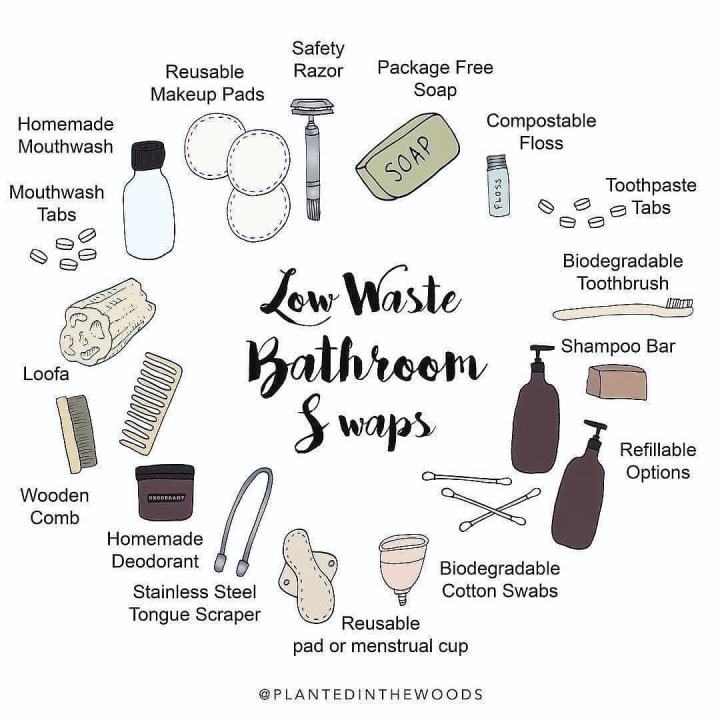
Another big thing you may not think about is your medication. While there is no plastic in the product itself, at least there shouldn't be, it often comes in plastic- prescription bottles, packets wrapped in plastic, etc. This itself isn't something you can change, but there are things you can do about how you take care of them when you're done.
When you get a plastic bottle or vial, take off all of the labeling and clean it. If it was a liquid substance, be careful about how you clean it. Depending on the product, getting even small amounts of residue in the water systems isn't great. Just like you need to properly dispose of the medication itself, even rinsing needs to be done with care. But, once the bottle/ vial/ packaging is cleaned out and label free, you can either toss the plastics in the recycling bin, or re-purpose them for something else. After all, many of them are for storage. Maybe fill the vials with beads you use for crafts, or use them as cheap shot glasses, ring holders, or small cups to take your meds with. Birth control packs can be used for storage as well, such as debit/credit cards if you have ones that come in a sleeve rather than the circular pouch. The possibilities are endless!

See? Single use plastic doesn't just boil down to plastic straws like big companies like to claim (Although, switching those to reusable ones, such as metal or bamboo, isn't a bad idea either!). There's a lot of small changes you can make in your day to day life that can make a huge impact, good or bad, over your lifetime.
But, this was just plastic.
What are some other things I can do to reduce my environmental impact?
I'm glad you asked!
When purchasing or leasing a different vehicle, opt for higher gas mileage options. These can include hybrids, or those engines that can utilize corn oil, but aren't just limited to these. A lot of newer models, particularly those manufactured in Europe, have a much better fuel efficiency. Not only do these vehicles reduce the environmental impact, but they'll cost less to fill up at the pump. Corn oil is by far the cheapest option when getting gas, but even if you do get regular fossil fuel packed oil, you'll have to stop for gas a whole lot less.
For instance, my poor, 15 year old car, used to have a good gas mileage... fifteen years ago. Hell, even 5 years ago when I got it, it was better than my previous car. Not by much, but instead of filling up twice a week (every 4 days or so, depending on my work/school schedule), I only needed to stop once every 5-8 days. Now, so many years after it's make, the fuel efficiency is garbage. At around 18.7 miles per gallon, there are a lot of newer models that run 30-40 miles per gallon. I'd only have to fill up a few times a month with gas mileage like that! And trust me, I also plan on switching once I get back to the States and have to drive again. Not just for the environmental impact, but for my poor, empty wallet in these times with high gas prices.
When shopping for groceries, go to locally sourced places. These can include farmer's markets, retail food co-ops, and even some larger grocery stores.
For instance, a large regional chain in the Midwest is Meijer. Meijer is one of the largest buyers of locally grown food product, using farms and food manufacturers as their primary source for grocery items, including milk, eggs, fruits, vegetables, and even meats. As a result, this means that it doesn't cost the environment to have these products shipped from who-knows-where, but also gives business to smaller, local farms and people. They won't have to use as many preservatives in order to send the produce the long distances, and last before going bad prior to purchase. No, these products are often fresher, fuller, and healthier- because they come from areas that are closer to your own backyard.

Grocery stores and restaurants are also big places where food waste comes into play. Yes, some of it can be found in our own homes, but think of all the bulk food that goes to waste if it's not bought. Many places won't even donate the unused or mistakenly made food to the poor, homeless, or even workers- options to throw it out instead. While there may not be a whole lot in this aspect you can do yourself, you can put pressure on the locations to look into alternatives. If you flood the industries with complaints and calls about wasted food, with enough impact to make their customer complaint lines miserable, they'll start to take the problem seriously. You can do the same with your local government, and try to enact bills that allow or even require places to donate a certain percentage of usable food waste to those in need- before it goes bad. The kicker here is before it actually does become waste, where it's not safe for anyone to consume.
But, if it does get to that point, it can also be composted. This goes with your household, also. This may not be as feasible in apartments, where there aren't compost bins or trucks to come collect compost, but many neighborhoods will have those options available. In the case of an apartment, you could even try to get a compost bin made for the complex. If enough residents show interest, your landlord may give in to the desire- especially if y'all complain a whole lot until it happens. Complaints can be pretty powerful- even if the other team gives in just to get you to stop talking about it. *wink wink*
You can also plant some of your own food products. Gardening is a great way to not only get some of your frequently purchased natural food product, cut down on your budget, and also creates more plants in the world that help filter out the CO2 in the air and replace it with the oxygen we need to breathe.
This can be done even if you don't live in an area where you can create a large garden. Sure, the larger gardens means you can make more product, and have a larger variety (including tomatoes, lettuce, strawberries, cucumbers, various spices, and more), but you can still go small scale and do the same in an apartment. It may work a bit easier for you if you have a patio or balcony to work off of in your apartment, but even a single window is enough space to make room for a pretty good potted plant.
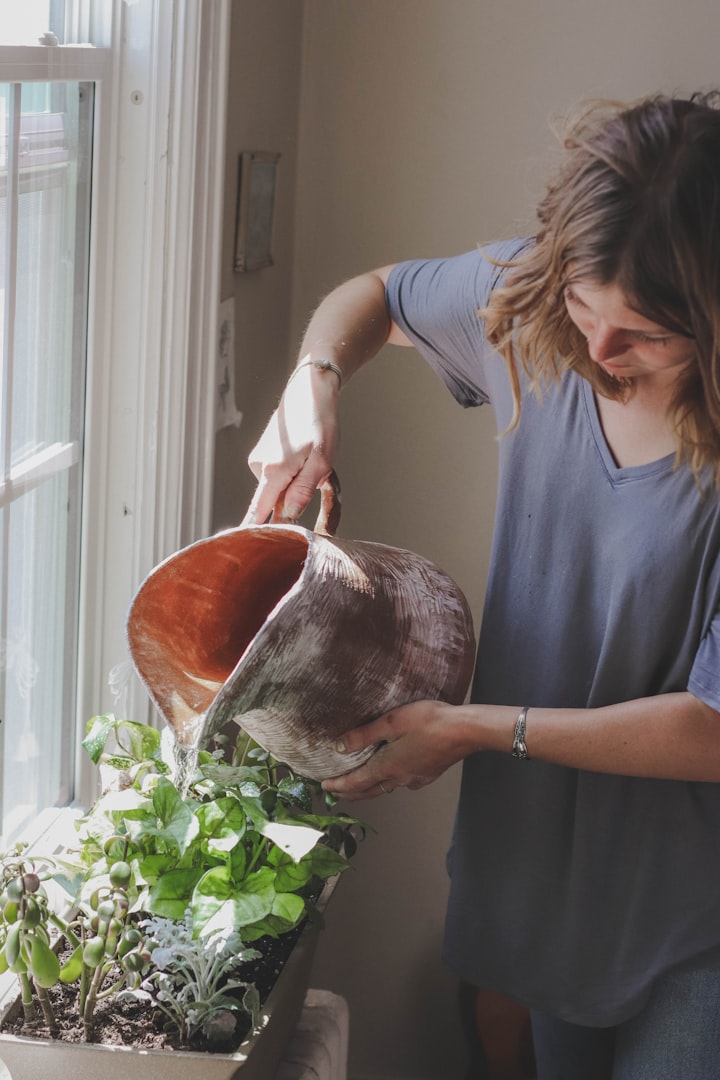
Even if you don't want to cut your grocery spending to grow your own small scale produce, you can still plant flowers, succulents, and the like. They're really pretty, can give happiness and a sense of pride/responsibly, and low-scale helps the environment. Why not pot some plants?
How about when travelling? Some people (especially before the Covid-19 pandemic) would often travel, flying either for work or pleasure. Certainly there's no way to reduce the impact on something like that, is there?
Of course there is! If possible, you can try to opt for lighter travel- bringing only the things you'll need for your trip, and not much, if any, extra. The more weight that is on a plane, the more fuel it will eat through on the journey. Keep that in mind when you're travelling, and pack less clothes if you can, washing the ones you have and wearing them again instead of tugging along your whole closet.
There are also some airlines that are offering outlets to spend money on environmental projects to replace the emissions from your travel. For instance, Air France has a program that allows you to calculate your environmental footprint impact from your flight, and then donate money equal to or more (as you desire) to compensate that into a program that helps plant trees, among other things. It even gives you the option to choose which project you want your money to go towards, or even split it among several. My ticket home would have cost about 6$ environmentally speaking, so I donated 10$ and chose to plant 5 trees in forests that border villages around Lake Togo (Togo is located in West Africa). This wasn't a significant cost to myself, as it came with the purchase of my ticket and was not mandatory, but also gave me peace of mind that I am making up for the impact that my travels would have otherwise had on our world.
If you live in a place where you control the landscape, and have few restrictions on what you can grow, replace your grass with self-maintaining plants.

Now, this doesn't mean plants that water themselves if there's not enough rain in a week, or even a drought. But, choices like different mosses, means that you won't have to trim it down or worry about it violating home owner's association or even local government regulations on height. Moss only grows to a certain height, so you won't need your lawn mower or weed whackers to cut or line your yard. That also means you won't have to pay for the fuel for those machines, which saves you money, time, and helps out the environment. You also won't need as much water as grass to keep them hydrated, or even have to worry about maintaining soil- other than keeping an eye on the pH every now and then.
There are other things to know about starting and keeping a moss lawn, such as figuring out the kind of moss that grows in your region and where to get it- rather than harvesting it from ecosystems that rely on its natural placement- but it's definitely a lot easier (and cheaper) in the long run than a lawn made of grass. Not to mention, it looks cooler too.
Also, moss tends to grow naturally pretty much anywhere: trees, rocks, cement, you name it. If it's in a place that isn't harming anything, like a brick wall, along the side of a house (but not obscuring windows or anything that would make it a hazard), on your sidewalk, etc, leave it be. It's not hurting anything, and killing it off means your killing plants that naturally recycle CO2 into oxygen. That just adds to the destruction of our planet, and takes away natural beauty from man-made spaces. I mean, have you seen old walls and buildings covered in moss, vines, and wallflowers? They're gorgeous! Don't disturb them if you don't have to.

There are easily hundreds of other ways in which you can start to reduce your environmental footprint on the world, and make the shift towards a brighter, greener future. However, just implementing even a few of these techniques is a wonderful start. Remember, just because it seems small, and you're just one person, doesn't mean it doesn't make an impact. Yes, big industries are responsible for a considerable portion of our current climate crisis, but there are steps we can start to put in motion to help fix this dire situation.
Think of it this way: have you ever heard the ripple effect, where "a ripple makes a wave someday," or any of its equivalent sayings originate? You are that ripple. When you start implementing these small, daily life habits and changes, it makes an impact. Others around you can see what you're doing, and take note. As they follow in your footsteps, that's less and less money that goes into corporate greed, which relies on people like us to fund these earth-killing products. If enough people take part, these companies will notice their loss of revenue, and start to change themselves for the better too. They may not change because they particularly want to, or even care about the planet, but they definitely care about the size of their wallets. If we, as individuals, take away that power one by one, eventually, these corporations will either conform to healthier products, or crumble. We, as ripples, make the wave.
So take the plunge! Make your ripple. Make that wave. Together, we can save our planet- one ripple, and wave, at a time.

____________________________________________________
*If you enjoyed or learned something important from this story, drop a like or share it with someone who may need to hear some of these things.
If you like, share, or donate, thank you so much! It is greatly appreciated and helps me keep improving.*
About the Creator
J. Lee
French enthusiast, non-binary trans person, artist, writer, lover of animals, space, and the right for every living thing to experience their existence authentically.
Pronouns: they/them (English) iel (French)




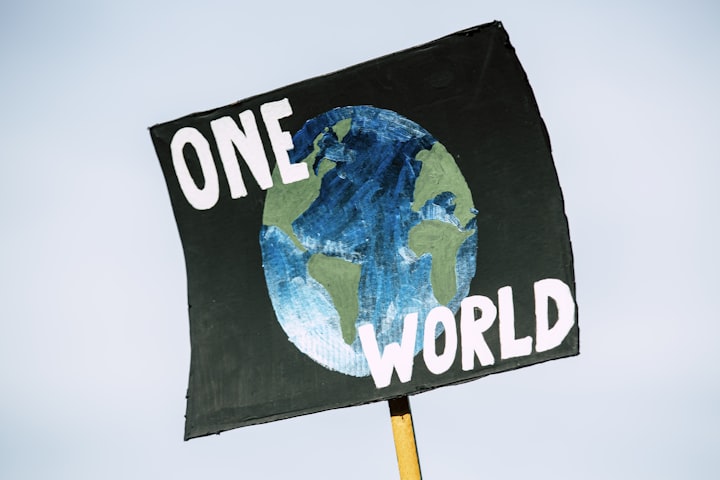


Comments
There are no comments for this story
Be the first to respond and start the conversation.